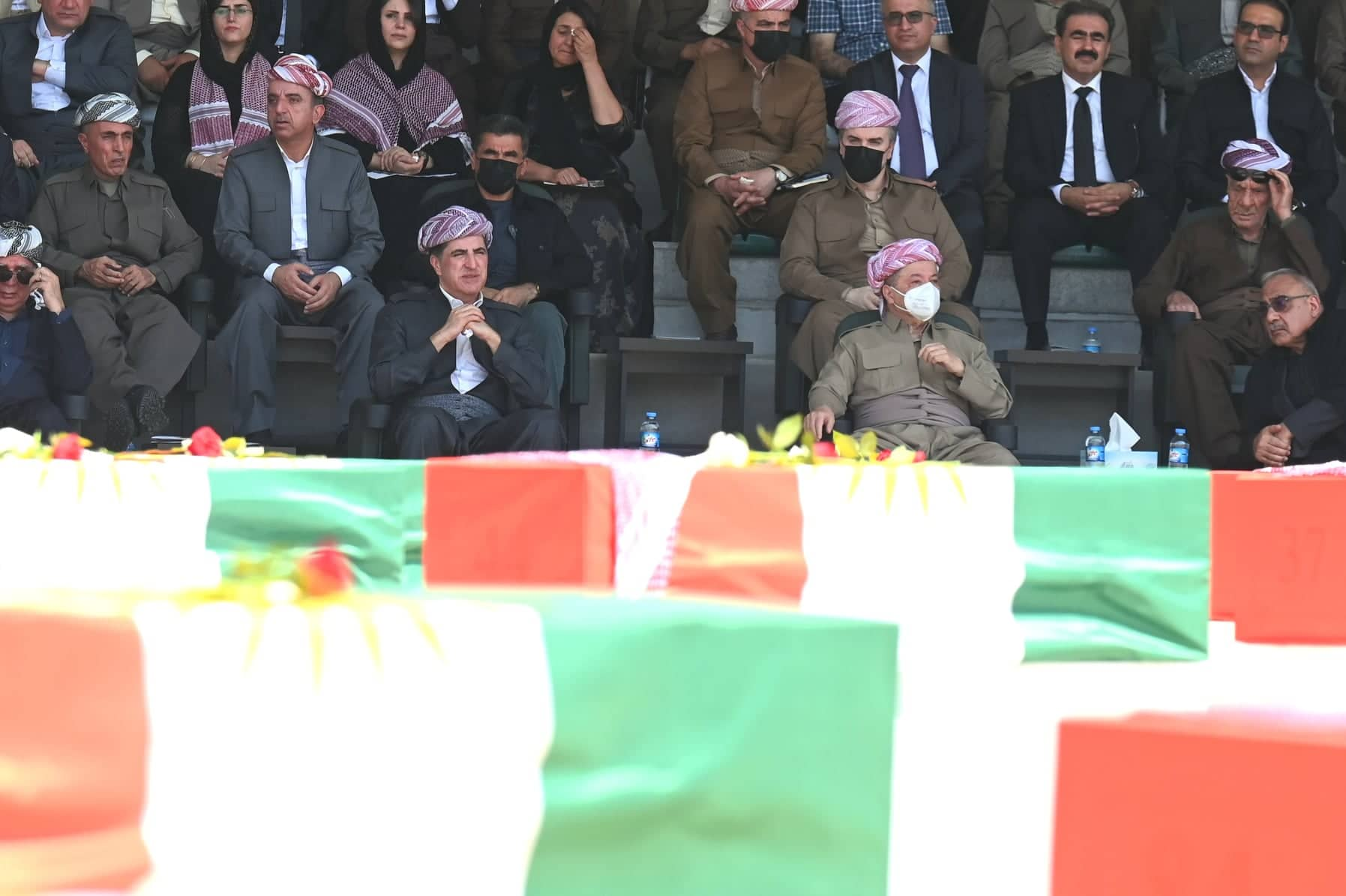
Kurdistan Democratic Party Leader Masoud Barzani mourns over a coffin draped with the Kurdish flag and containing the remnants of a victim of Barzan genocide on July 31, 2022. Photo: Bilind T. Abdullah/Rudaw
ERBIL, Kurdistan Region - The remains of 100 victims of the Barzan genocide committed against the Barzani tribe by Iraq’s former regime were laid to rest on Sunday.
The remains were found in mass graves in southern Iraq earlier this month and were returned home to the Barzan area where they were buried in unmarked graves without being identified through DNA testing. Thousands of others are still missing.
Held in Barzan, the burial ceremony was attended by Iraqi and Kurdish officials, including Kurdistan Region President Nechirvan Barzani and Kurdistan Democratic Party (KDP) Leader Masoud Barzani.
The coffins arrived at Erbil airport from Baghdad on Saturday and were later taken back to Barzan ahead of burial.
Speaking at the ceremony, KDP Leader Barzani said, “once again, our old wound has been renewed.”
On July 31, 1983, an estimated 8,000 members of the Barzani tribe were rounded up, abducted from their homes in the Zagros mountains, and taken to the deserts of southern Iraq where they were killed on the orders of the Baath regime.
The Kurdish leader described the death of thousands of Barzani as a “tragedy and a deep wound that cannot be forgotten.”
Participated in the burial of 100 Barzani martyrs as part of the 1983 Genocide by the former Iraqi regime which resulted in the murder of 8,000 innocent people. Their "crime" was that they were born Barzanis. I pray to His Almighty that their souls are in better places. pic.twitter.com/I88R2RCMYo
— Masoud Barzani (@masoud_barzani) July 31, 2022
The Barzan atrocity was an act of collective punishment of the Barzanis, whose leaders were active in Kurdish revolts against the Iraqi regime. Men and boys were the primary targets, but women, children, and the elderly were all victims. Thirty-nine years later, the wounds are still fresh for the survivors and family members.
Dozens of men and women carried photos of their brothers, fathers, uncles, or any relative killed by the ruling regime at the time.
Some families had lost up to 16 members of their family in the Barzan genocide.
President Barzani in a statement said the Barzan genocide strengthened the resistance of the Kurdish people.
Kurdistan Regional Government (KRG) Prime Minister Masrour Barzani in a statement renewed compensation calls from the Iraqi government for the survivors and families affected by the genocide.
The crimes against the Barzan tribe were part of the Baathist regime’s genocidal Anfal campaign to exterminate the Kurds. Anfal - the eighth chapter, or Surah, in the Quran - was the codename used by Baathists for the slaughter. It literally translates as the spoils of war. More than 182,000 people were killed and over 4,500 villages were destroyed in eight phases of the Anfal campaign in the 1980s that culminated with the chemical weapon attack on Halabja.
The remains of 596 Barzanis were returned previously returned to Barzan.
The Iraqi Supreme Court has recognized the Anfal campaign as constituting genocide, crimes against humanity, and war crimes. However, the international community is largely yet to do so.









Comments
Rudaw moderates all comments submitted on our website. We welcome comments which are relevant to the article and encourage further discussion about the issues that matter to you. We also welcome constructive criticism about Rudaw.
To be approved for publication, however, your comments must meet our community guidelines.
We will not tolerate the following: profanity, threats, personal attacks, vulgarity, abuse (such as sexism, racism, homophobia or xenophobia), or commercial or personal promotion.
Comments that do not meet our guidelines will be rejected. Comments are not edited – they are either approved or rejected.
Post a comment